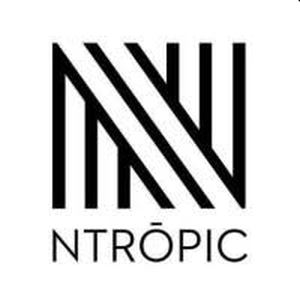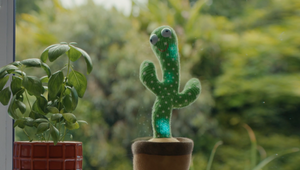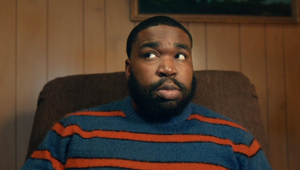
Meet Your Makers: Veronica Ware on Making Her Voice Heard

Veronica Ware is the head of production at award-winning creative studio Ntropic, an experienced veteran whose ability to inspire creative teams and optimise workflows has resulted in top-tier storytelling across live-action, animation, VFX, VR, AR and more.
Ware oversees the production for Ntropic’s New York (and sometimes West Coast) hub, collaborating with a dedicated team of producers and creatives on a range of content for some of the world’s most respected brands - from product launches for Oral B to Oculus experiences for South Korean pop megastars BTS. A natural leader, her career is defined not only by successful projects but by an uncommon ability to apply empathy as a mentor for team members and incoming producers.
LBB> What first attracted you to production - and has it been an industry you’ve always worked in or did you come to it from another area?
Veronica> I’ve been obsessed with music videos since I was a kid. I would study the framing and shooting aesthetic of each director, set designs, cut of the edits, and colour tonality. I knew I wanted to create them. I thought being a director was the only way I could do this until I got to college and realised my interests gravitated towards producing.
LBB> What was your first role in the production world and how did this experience influence how you think about production and how you grew your career?
Veronica> My first role in production was in college. I was working on a student-run TV show where my friend and I would create packages. We’d choose events to cover, interview students, etc. It forced me to be resourceful and convince people to let me film them, while giving direction to the talent in frame. It improved my communication skills and my confidence. I quickly moved up to running the entire show with two of my friends, which taught me the importance of supporting my crew and that in-turn they would support me. Several of the students wanted to quit because the show would take several hours a week to tape. We were only kids in college, but many said the reason they stayed was because of a mutual respect we had for each other. No one wanted to let anyone down - we were a team. I carry this team mentality into each project I produce. I believe in supporting people to help them grow in their career, just as others have helped me over the years.
LBB> How did you learn to be a producer?
Veronica> I learned to be a producer by making a lot of mistakes and observing as much as I could. I’d talk to the artists and crew members on my jobs as much as I could - asking them what they do, how they do it, and what they liked about certain producers and creatives. I tried to gather as many experiences and learn from them as best I could. After a point, the dots all connected and became a fun puzzle I assembled on each project I worked on.
LBB> Looking back to the beginning of your career, can you tell us about a production you were involved in where you really had to dig deep and that really helped you to grow as a producer?
Veronica> The first shoot that I directed and produced for a client, I was about 23 years old. My HOP/mentor was very trusting and let me run the whole production with crew and clients 10 - 20 years older than me. I could tell at one point that everyone was getting nervous. I was setting up a shot and everyone was giving me suggestions/directions all at once. Instead of being overwhelmed, I stood my ground and spoke with confidence. I made it clear that I was sticking to the plan I made with my crew and everything the clients needed would be covered.
The next day, my HOP pulled me into his office and told me he was very proud of me for planning the shoot and for being firm in my plan. He knew it was not easy for me to stand up for myself with various older men speaking over me and trying to contradict me.
LBB> A good producer should be able to produce for any medium, from film to events to digital experience. Do you agree or disagree with this statement? Why/why not?
Veronica> I think everyone has their strengths and talents. I’ve produced live action, post production, and VFX. I’ve successfully produced industrial films, commercials, immersive VR, independent films, installations, TV and film. I also know a lot of great producers who work in one specific medium. I think it does make you a better producer to work outside your comfort zone when you can, to understand what obstacles can pop up and how to problem-solve them on the fly.
LBB> What’s your favourite thing about production and why?
Veronica> I love problem solving and helping people to an unhealthy degree. In production, all of that collaborating, effort, and stress creates something that people are happy with and can share with the world (or local area via social media for a specific demographic). Creating a space for the artists and creatives to do what they love and share it with the world always gives me a jolt of happiness. It reminds me why I’m still in this business.
LBB> How has production changed since you started your career?
Veronica> The technology and speed of production has changed so much. Not to date myself, but I remember QCing commercials on a Beta tape. Having to jog from frame to frame checking for picture errors before physically running the tape to DG Fastchannel. A painful process that I do not miss at all. The process of production today is much faster. The timelines are shorter and more intense. The creative process is more explorative with an infinite amount of options. It seems that, because we CAN do almost anything, that people really want as many options as possible before making a creative decision.
LBB> And what has stayed the same?
Veronica> Creative concepting and execution always will be a subjective medium that requires everyone to work together - regardless of technology advances. Everyone can hear and see the same references and have a completely different take on the request. It’s pretty wild. Sometimes what a person infers can evolve the creative into something beautiful. Creative collaboration is something that will always stay the same.
LBB> What do you think is the key to being an effective producer - and is it something that’s innate or something that can be learned?
Veronica> Communication is key to being an effective producer. Asking the right question; explaining a clarifying note; delegating tasks. Everyone wants to know why they have to do the task you’re requesting. Explaining your request helps everyone get on the same page. Talking is innate for many, but communicating client, artist, and production needs is a skill that anyone can and should learn.
Also, relationships are very important. I love working with new people, but building a group of trusted and talented allies helps make each project move smoothly.
LBB> Which production project from across your career are you most proud of and why?
Veronica> It’s pretty difficult to choose one, but there was an installation project I worked on for about six months. I cocooned with a team of 20 or so artists - producing various films and designs with amazing people. There were so many moving parts, yet it was repetitive at the same time. I would call daily meetings and try to find ways to keep the team interested in working on the same project day in and day out. After the project had delivered successfully, many of the artists mentioned how much they enjoyed working on the project - the tone we set, the communication, and the team we built. I was so proud to see everyone work together and support each other. It was the first time where I really wanted to take on a role that would have a larger impact on people’s lives.
LBB> And in terms of recent work, which projects have you found to be particularly exciting or have presented particularly interesting production challenges?
Veronica> I really enjoy VR projects. When they first popped up, the technical aspects were very challenging for me and required problem solving with a group. It was an area different from traditional VFX and I was excited to step outside of my comfort zone.
LBB> Producers always have the best stories. What’s the hairiest / most insane situation you’ve found yourself in and how did you work your way out of it?
Veronica> There was a project where notes from the director were coming down to the wire for an international delivery. We originally scheduled about a full week to ship the final on a drive to arrive to the client in time for their showcase (it was a heavy NDA project - the client wanted a drive handed to them in Paris). The notes kept encroaching on our time and pushing past our ability to rush ship internationally on time. After exhausting options, we decided to buy a plane ticket for an assistant to fly from NYC to Paris, drop off a hard drive, eat a croissant, and immediately hop back on a return flight.
LBB> What are your personal ambitions or aspirations as a producer?
Veronica> My main aspiration was to be an head of production, which I was promoted to this year. I love streamlining production and communication with a squeaky clean workflow. I want to be able to shape the culture of a company in a positive way and help with its growth. I’m sure my next goal will involve helping people to improve the creative process.
LBB> As a producer your brain must have a never ending "to do" list. How do you switch off? What do you do to relax?
Veronica> The only way I can totally switch off and relax is if I go on a vacation for a week or more to a place with no reception. Otherwise, my ‘to do’ list cycles through my head constantly, whether or not I do it immediately is dependent on my brain and body agreeing to continue working.
LBB> Producers are problem solvers. What personally fuels your curiosity and drive?
Veronica> I see all of production as one big puzzle. If two pieces don’t work, there’s another piece that will - and I’m always determined to find it. I love learning new solutions to tackle a problem. What keeps me going is when people are happy at the end of the project or with my work. I like feeling appreciated and respected.
LBB> What advice would you give to people who are interested in becoming a producer?
Veronica> Ask questions and speak up. There is no dumb question, just impatient people. I was always too nervous to ask people what to do or afraid it would come off as if I didn’t know what I was doing. So I often suffered in silence.
I think about how much faster I could have progressed in my career if I spoke up and advocated for myself more often. I usually waited until I was pushed to my limit to speak up.
LBB> From your experience what are the ingredients for a successful production?
Veronica> I think communication, patience, and organisation are key attributes of a producer. A person that is detail oriented and great at time management will be extremely successful.
LBB> What’s the key to a successful production-client relationship?
Veronica> I believe in transparency of the process and educating the client. When I communicate with them, I approach it from an empathetic standpoint - asking myself “what are they dealing with on a daily basis?” Understanding a client’s point of view and aligning with them helps everyone work as a team. In the end, we all want a great looking product we’re happy with. Everything can be worked out around a common goal.











